- Home
- Robin Hobb
The Soldier Son Trilogy Bundle
The Soldier Son Trilogy Bundle Read online
The Soldier Son Trilogy Bundle
Robin Hobb
Contents
Cover
Title Page
Shaman’s Crossing: Book One
Title Page
Dedication
Chapter One: Magic and Iron
Chapter Two: Harbinger
Chapter Three: Dewara
Chapter Four: Crossing the Bridge
Chapter Five: The Return
Chapter Six: Sword and Pen
Chapter Seven: Journey
Chapter Eight: Old Thares
Chapter Nine: The Academy
Chapter Ten: Classmates
Chapter Eleven: Initiation
Chapter Twelve: Letters from Home
Chapter Thirteen: Bessom Gord
Chapter Fourteen: Cousin Epiny
Chapter Fifteen: Séance
Chapter Sixteen: A Ride in the Park
Chapter Seventeen: Tiber
Chapter Eighteen: Accusations
Chapter Nineteen: Intervention
Chapter Twenty: Crossing
Chapter Twenty-One: Carnival
Chapter Twenty-Two: Disgrace
Chapter Twenty-Three: Plague
Chapter Twenty-Four: Vindication
Forest Mage: Book Two
Title Page
Dedication
Map
Chapter One: Forest Dreams
Chapter Two: Homeward Bound
Chapter Three: Spindle Dance
Chapter Four: The Fast
Chapter Five: Rosse’s Wedding
Chapter Six: A Day of Letters
Chapter Seven: Dewara
Chapter Eight: Judgment
Chapter Nine: Plague
Chapter Ten: Flight
Chapter Eleven: Franner’s Bend
Chapter Twelve: The King’s Road
Chapter Thirteen: Buel Hitch
Chapter Fourteen: Journey to Gettys
Chapter Fifteen: Gettys
Chapter Sixteen: The Cemetery
Chapter Seventeen: Routine Duty
Chapter Eighteen: Visitor
Chapter Nineteen: Winter
Chapter Twenty: Spring
Chapter Twenty-One: Olikea
Chapter Twenty-Two: Fenceposts
Chapter Twenty-Three: Two Women
Chapter Twenty-Four: An Envelope
Chapter Twenty-Five: The Road
Chapter Twenty-Six: Dancers
Chapter Twenty-Seven: The Ambush
Chapter Twenty-Eight: Coffins
Chapter Twenty-Nine: The Messenger
Chapter Thirty: The Apology
Chapter Thirty-One: Accusations
Chapter Thirty-Two: Lisana
Chapter Thirty-Three: Court-martial
Chapter Thirty-Four: Surrender
Renegade’s Magic: Book Three
Title Page
Map
Chapter One: Soldier’s End
Chapter Two: Flight
Chapter Three: Lisana
Chapter Four: Mage Work
Chapter Five: The Other Side
Chapter Six: Confrontations
Chapter Seven: Epiny’s Ultimatum
Chapter Eight: Quick-walk
Chapter Nine: Journey in Darkness
Chapter Ten: Dream-walker
Chapter Eleven: The Wintering Place
Chapter Twelve: Trade Goods
Chapter Thirteen: Hoarding
Chapter Fourteen: The Trading Place
Chapter Fifteen: The Invitation
Chapter Sixteen: Kinrove
Chapter Seventeen: Treachery
Chapter Eighteen: Boxed
Chapter Nineteen: The Summoning
Chapter Twenty: Battle Plans
Chapter Twenty-One: Massacre
Chapter Twenty-Two: Retreat
Chapter Twenty-Three: Tidings
Chapter Twenty-Four: Resolutions
Chapter Twenty-Five: Decisions
Chapter Twenty-Six: The Dance
Chapter Twenty-Seven: The Tree
Chapter Twenty-Eight: Emergence
Chapter Twenty-Nine: Dead Man’s Quest
Chapter Thirty: Reunion
Chapter Thirty-One: Lives in the Balance
Chapter Thirty-Two: Decisions and Consequences
Chapter Thirty-Three: Face-to-Face
Chapter Thirty-Four: Retrospection
About the Author
Also by Robin Robb
Copyright
About the Publisher
SHAMAN’S CROSSING
BOOK ONE OF THE SOLDIER SON TRILOGY
ROBIN HOBB
Dedication
To Caffeine and Sugar
my companions through many a
long night of writing
CHAPTER ONE
MAGIC AND IRON
I remember well the first time I saw the magic of the Plainspeople.
I was eight and my father had taken me with him on a trip to the outpost on Franner’s Bend. We had arisen before the dawn for the long ride; the sun was just short of standing at noon when we finally saw the flag waving over the walls of the outpost by the river. Once Franner’s Bend had been a military fort on the contested border between the Plainspeople and the expanding kingdom of Gernia. Now it was well within the Gernian border, but some of its old martial glory persisted. Two great cannons guarded the gates, but the trade stalls set up against the mud-plastered stockade walls behind them dimmed their ferocity. The trail we had followed from Widevale now joined a road that picked its way among the remains of mud-brick foundations. Their roofs and walls were long gone, leaving the shells gaping at the sky like empty tooth sockets in a skull. I looked at them curiously as we passed, and dared a question. “Who used to live here?”
“Plainspeople,” Corporal Parth said. His tone said that was his full reply. Rising early did not suit his temperament, and I suspected already that he blamed me for having to get out of bed so early.
I held my tongue for a time, but then the questions burst out of me. “Why are all the houses broken and gone? Why did they leave? I thought the Plainspeople didn’t have towns. Was this a Plainspeople town?”
“Plainspeople don’t have towns, they left because they left, and the houses are broken because the Plainspeople didn’t know how to build any better than a termite does.” Parth’s low-voiced answer implied I was stupid for asking.
My father has always had excellent hearing. “Nevare,” he said.
I nudged my horse to move up alongside my father’s taller mount. He glanced at me once, I think to be sure I was listening, and then said, “Most Plainspeople did not build permanent towns. But some, like the Bejawi folk, had seasonal settlements. Franner’s Bend was one of them. They came with their flocks during the driest part of the year, for there would be grazing and water here. But they didn’t like to live for long in one place, and so they didn’t build to last. At other times of the year, they took their flocks out onto the Plains and followed the grazing.”
“Why didn’t they stay here and build something permanent?”
“It wasn’t their way, Nevare. We cannot say they didn’t know how, for they did build monuments in various locations that were significant to them, and those monuments have weathered the tests of time very well. Someday I shall take you to see the one called Dancing Spindle. But they did not make towns for themselves as we do, or devise a central government, or provide for the common good of their people. And that was why they remained a poor, wandering folk, prey to the Kidona raiders who preyed on them and to the vagaries of the seasons. Now that we have settled the Bejawi and begun to teach them how to maintain villages and schools and stores, they will learn to prosper.”
I pondered this. I knew the Bejawi. Some of them had settled near the north end of Widevale, my father’s holdings. I’d been there once. It was a dirty place, a random tumble of houses without streets, with garbage and sewage and offal scattered all around it. I hadn’t been impressed. As if my father could hear my thoughts, he said, “Sometimes it takes a while for people to adapt to civilization. The learning process can be hard. But in the end, it will be of great benefit to them. The Gernian people have a duty to lift the Bejawi folk and help them learn civilized ways.”
Oh. That I understood. Just as struggling with math would someday make me a better soldier. I nodded and continued to ride at his stirrup as we approached the outpost.
The town of Franner’s Bend had become a traders’ rendezvous where Gernian merchants sold overpriced wares to homesick soldiers and purchased handmade Plains goods and trinkets from the bazaar for the city markets in the west. The military contingent there, with its barracks and headquarters, was still the heart of the town, but the trade had become the new reason for its existence. Outside the fortified walls a little community had sprung up around the riverboat docks. A lot of common soldiers retired there, eking out their existence with handouts from their younger comrades. Once, I suppose, the fort at Franner’s Bend had been of strategic importance. Now it was little more than another backwater on the river. The flags were still raised daily with military precision and a great deal of ceremony and pomp. But as my father told me on the ride there, duty at Franner’s Bend was a “soft post now,” a plum given to older or incapacitated officers who did not wish to retire to their family homes yet.
Our sole reason for visiting was to determine if my father could win the military contract for sheepskins to use as saddle padding. My family was just venturing into sheepherding at that point in time, and he wished to determine the real market for them before investing too heavily in the silly creatures. Much as he detested playing the merchant, he told me, as a new noble he had to establish the investments that would support his estate and allow it to grow. “I’ve no wish to hand your brother an empty title when he comes of age. The future Lord Burvelles of the east must have income to support a noble lifestyle. You may think that has nothing to do with you, young Nevare, for as a second son, you must go to be a soldier. But when you are an old man and your soldiering days are through, you will come home to your brother’s estate to retire. You will live out your days at Widevale, and the income of the estate will determine how well your daughters will marry, for it is the duty of a noble first son to provide for his soldier brother’s daughters. It behooves you to know about these things.”
I understood little, then, of what he was telling me. Of late, he talked to me twice as much as he ever had, and I felt I understood only half as much of what he said. He had only recently parted me from my sisters’ company and their gentle play. I missed them tremendously, as I did my mother’s attentions and coddling. The separation had been abrupt, following my father’s discovery that I spent most of my afternoons playing “tea party” in the garden with Elisi and Yaril, and had even adopted a doll as my own to bring to the nursery festivities. Such play alarmed my father for reasons my eight-year-old mind could not grasp. He had scolded my mother in a muffled “discussion” behind the closed doors of the parlor, and instantly assumed total responsibility for my raising. My schoolbook lessons were suspended, pending the arrival of a new tutor he had hired. In the intervening days, he kept me at his side for all sorts of tedious errands and constantly lectured me on what my life would be like when I grew up to be an officer in the king’s cavalla. If I was not with my father, and sometimes even when I was, Corporal Parth supervised me.
The abrupt change had left me both isolated and unsettled. I sensed I had somehow disappointed my father, but was unsure of what I had done. I longed to return to my sisters’ company. I was also ashamed of missing them, for was I not a young man now and on my path to be my father’s soldier son? So he often reminded me, as did fat old Corporal Parth. Parth was what my mother somewhat irritably called a “charity hire.” Old, paunchy, and no longer fit for duty, he had come to ask my father’s aid and been hired as an unskilled groundskeeper. He was now the temporary replacement for the nanny I had shared with my sisters. He was supposed to school me in “the basics of military bearing and fitness” each day until my father could locate a more qualified instructor. I did not think much of Parth. Nanny Sisi had been more organized and demanded more discipline of me than he did. The slouching old man who had carried his corporal’s rank into retirement with him regarded me as more of a nuisance and a chore than a bright young mind to be shaped and a body to be built with rigor. Often, when he was supposed to be teaching me riding, we spent an hour of that allotted time with him napping while I practiced “being a good little sentry and keeping watch,” which meant that I sat in the branches of a shady tree while he slept beneath it. I had not told my father any of that, of course. One thing Parth had already instructed me in was that he was the commander and I was the soldier, and a good soldier never questioned his orders.
My father was well known at Franner’s Bend. We rode through the town and up to the gates of the fortress. There he was saluted and welcomed without question. I looked curiously about me as we rode past an idle smith’s shop, a warehouse, and a barracks before we reined in our horses before the commander’s headquarters. I gaped up at the grand stone building, three stories tall, as my father gave Parth his instructions regarding me.
“Give him a tour of the outpost and explain the layout of it. Show him the cannons and talk to him about their placement and range. The fortifications here are a classic arrangement of defenses. See that he understands what that means.”
If my father had looked back as he ascended the steps, he would have seen how Parth rolled his eyes. My heart sank. It meant that Parth had little intention of complying with my father’s orders, and that I would later be held accountable for what I had not learned. It had already happened twice before, with me being blamed for a “lack of attention” rather than Parth for his lack of instruction. I resolved that would not happen this time.
I followed him as we walked a short distance down the street. “That’s a barracks, where soldiers live,” he told me. “And that’s a canteen, tacked onto the end of it. That’s the place where soldiers can get a beer and a bit of relaxation when they aren’t on duty.” The tour of the fort stopped there. The barracks and canteen were constructed of wooden planks, painted green and white. It was a long, low building with an open porch running the length. Off-duty soldiers idled there, sewing, blacking their boots, or talking and smoking or chewing as they sat on hard benches in the paltry shade. Outside the canteen, another porch offered refuge for a class of men I knew well. Too old to serve or otherwise incapacitated, these men wore a rough mix of military uniform and civilian garb. A lone woman in a faded orange dress slouched at one table, a limp flower behind her ear. She looked very tired. Mustered-out soldiers often approached my father in hopes of work and a place to live. If he thought they had any use at all, he usually hired them on, much to my lady mother’s dismay. But these men, I immediately knew, my father would have turned away. Their clothes were unkempt, their unshaven faces smudged with dirt. Half a dozen of them loitered on the benches, drinking beer, chewing tobacco and spitting the brownish stuff onto the dirt floor. The stink of tobacco juice and spilled beer hung in the air.
As we passed by, Parth glanced longingly into the low windows, and then delightedly hailed an old crony of his, one he evidently hadn’t seen in years. I stood by, politely bored, as the two men exchanged reports on their current lives through the window opening. Parth’s friend leaned on the sill and talked to us as we stood in the street. Vev had only recently arrived at the fort, with his wife and his two sons. He’d been mustered out after he injured his back in a fall from his horse. Like many a soldier when his soldiering days were done, he had no resources to fall back on. His wife did a bit
of sewing to keep a roof over their heads, but it was rocky going. And what was Parth doing these days? Working for Colonel Burvelle? I saw Vev’s face lighten with interest. He immediately invited Parth to join him in a beer to celebrate their reunion. When I started to follow him up the steps, Parth glared at me. “You wait outside for me, Nevare. I won’t be long.”
“You’re not supposed to leave me alone in town, Corporal Parth,” I reminded him. I’d heard my father articulate that carefully on the ride here; young as I was, I was still a bit surprised he’d forgotten it already. I waited for him to thank me for the reminder. I considered that my due, for whenever my father had to remind me of a rule I had forgotten, I had to thank him and accept the consequences of my lapse.
Instead he scowled at me. “You ain’t alone out here, Nevare. I can see you right from the window, and there’s all these old sojers keeping an eye on you. You’ll be fine. Just sit yourself down by the door and wait like I told you.”
“But I’m supposed to stay with you,” I objected. My order to stay in Parth’s company was a separate order from his to watch me and show me the fort. He might get in trouble for leaving me alone outside. And I feared my father would do more than rebuke me for not following Parth as I was supposed to.

 Ship of Destiny
Ship of Destiny Golden Fool
Golden Fool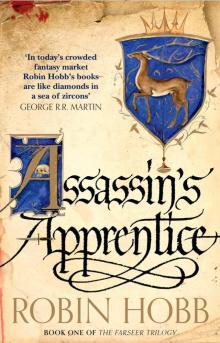 Assassins Apprentice
Assassins Apprentice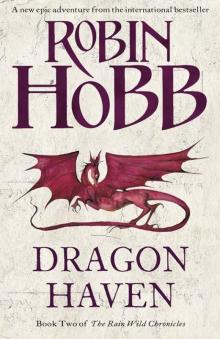 The Dragon Keeper
The Dragon Keeper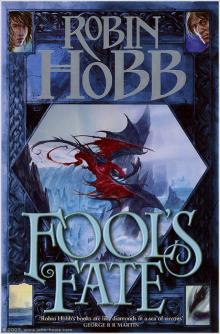 Fools Fate
Fools Fate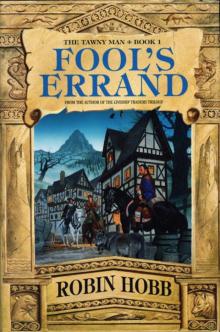 Fools Errand
Fools Errand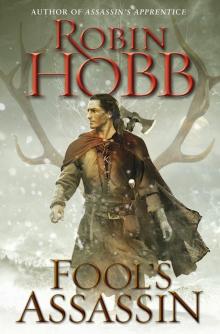 Fools Assassin
Fools Assassin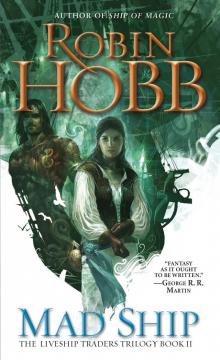 The Mad Ship
The Mad Ship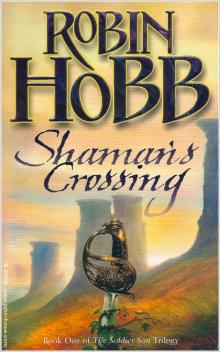 Shamans Crossing
Shamans Crossing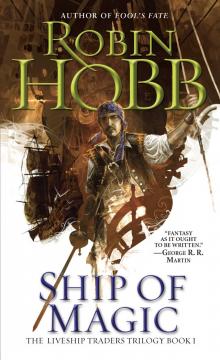 Ship of Magic
Ship of Magic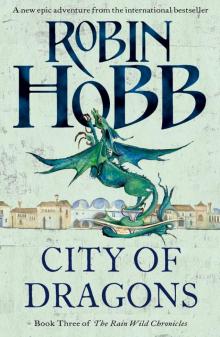 City of Dragons
City of Dragons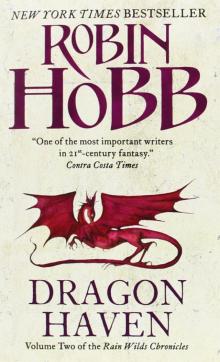 Dragon Haven
Dragon Haven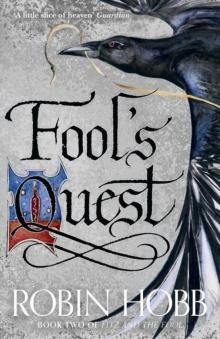 Fools Quest
Fools Quest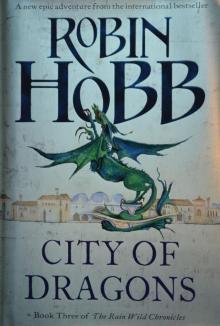 Blood of Dragons
Blood of Dragons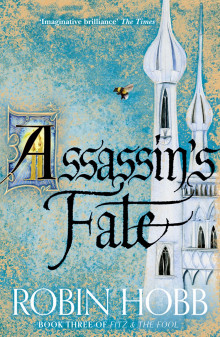 Assassin's Fate
Assassin's Fate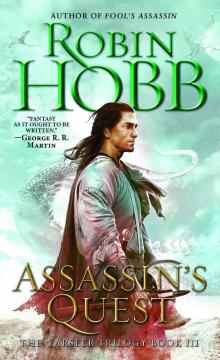 Assassins Quest
Assassins Quest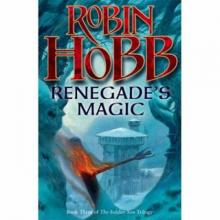 Renegades Magic
Renegades Magic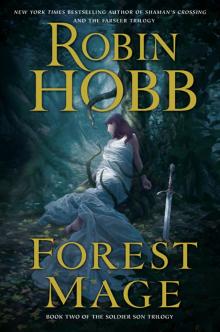 Forest Mage
Forest Mage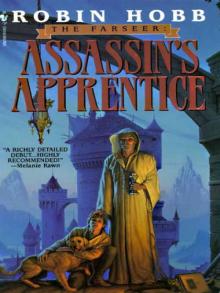 Assassin's Apprentice tft-1
Assassin's Apprentice tft-1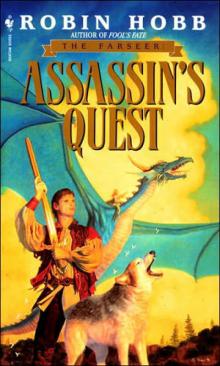 Assassin's Quest tft-3
Assassin's Quest tft-3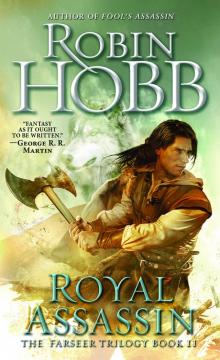 Royal Assassin
Royal Assassin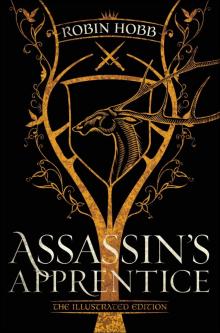 Assassin's Apprentice (The Illustrated Edition)
Assassin's Apprentice (The Illustrated Edition)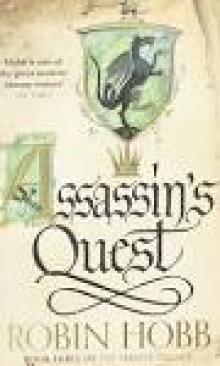 Assassin's Quest (UK)
Assassin's Quest (UK)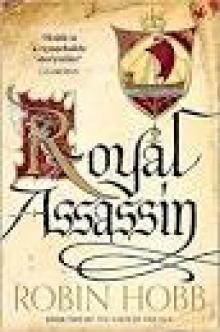 Royal Assassin (UK)
Royal Assassin (UK)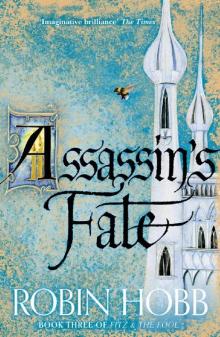 FF3 Assassin’s Fate
FF3 Assassin’s Fate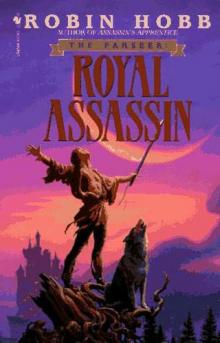 Royal Assassin tft-2
Royal Assassin tft-2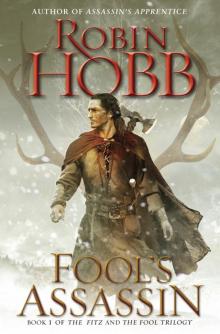 Fool’s Assassin: Book One of the Fitz and the Fool Trilogy
Fool’s Assassin: Book One of the Fitz and the Fool Trilogy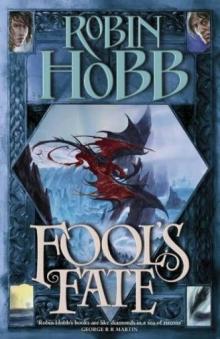 Fool's Fate ttm-3
Fool's Fate ttm-3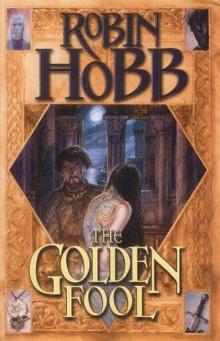 The Golden Fool ttm-2
The Golden Fool ttm-2 The Liveship Traders Series
The Liveship Traders Series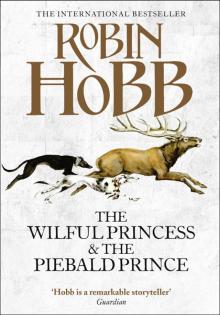 The Wilful Princess and the Piebald Prince
The Wilful Princess and the Piebald Prince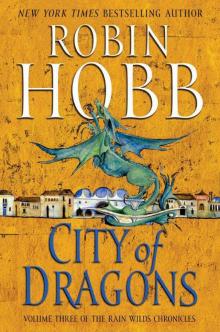 City of Dragons rwc-3
City of Dragons rwc-3 The Tawny Man 1 - Fool's Errand
The Tawny Man 1 - Fool's Errand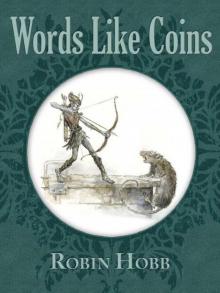 Words Like Coins
Words Like Coins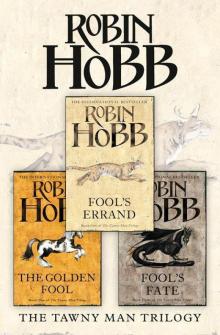 The Complete Tawny Man Trilogy Omnibus
The Complete Tawny Man Trilogy Omnibus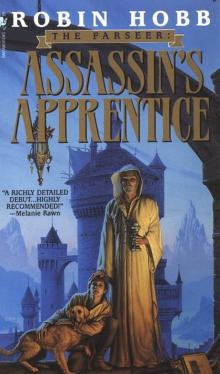 Farseer 1 - Assassin's Apprentice
Farseer 1 - Assassin's Apprentice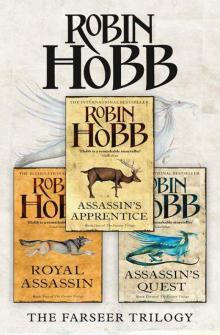 The Complete Farseer Trilogy Omnibus
The Complete Farseer Trilogy Omnibus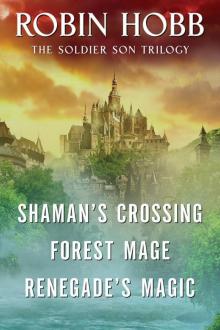 The Soldier Son Trilogy Bundle
The Soldier Son Trilogy Bundle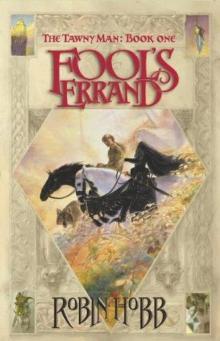 Fool's Errand ttm-1
Fool's Errand ttm-1 Blue Boots
Blue Boots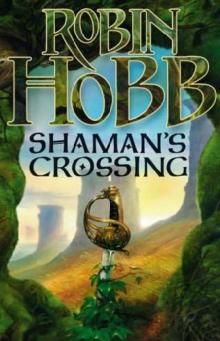 Shaman's Crossing ss-1
Shaman's Crossing ss-1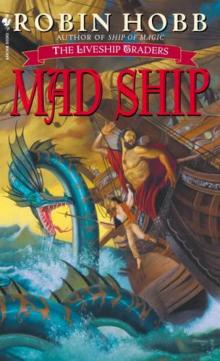 Mad Ship
Mad Ship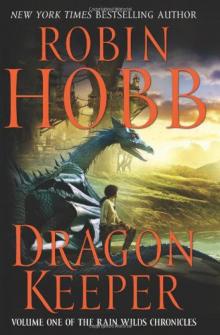 Dragon Keeper
Dragon Keeper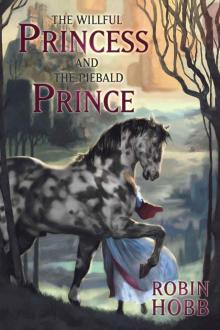 The Willful Princess and the Piebald Prince
The Willful Princess and the Piebald Prince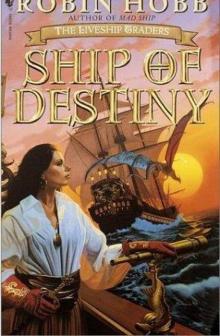 Ship of Destiny tlt-3
Ship of Destiny tlt-3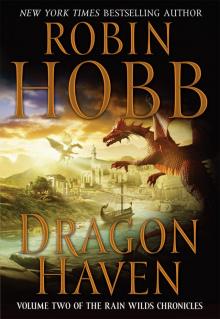 Rain Wild Chronicles 02 - Dragon Haven
Rain Wild Chronicles 02 - Dragon Haven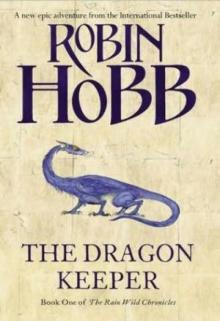 The Dragon Keeper trwc-1
The Dragon Keeper trwc-1 The Triumph
The Triumph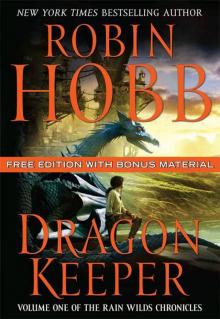 Dragon Keeper Free Edition with Bonus Material
Dragon Keeper Free Edition with Bonus Material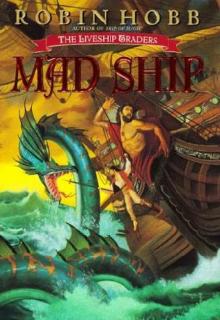 Mad Ship tlt-2
Mad Ship tlt-2 The Inheritance and Other Stories
The Inheritance and Other Stories Tawny Man 02 - Golden Fool
Tawny Man 02 - Golden Fool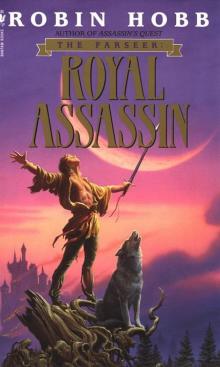 Farseer 2 - Royal Assassin
Farseer 2 - Royal Assassin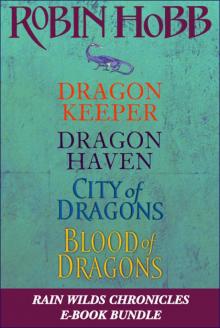 Rain Wilds Chronicles
Rain Wilds Chronicles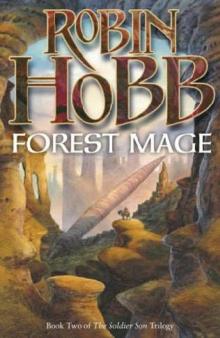 Forest Mage ss-2
Forest Mage ss-2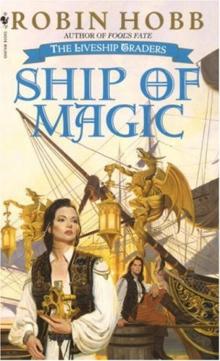 Ship of Magic lt-1
Ship of Magic lt-1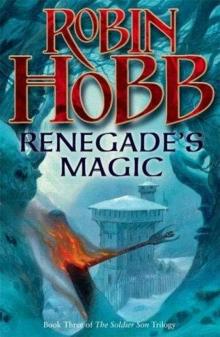 Renegade's Magic ss-3
Renegade's Magic ss-3